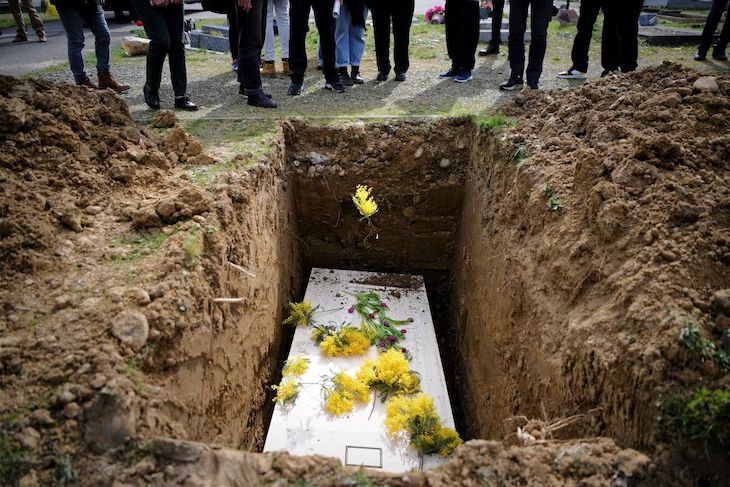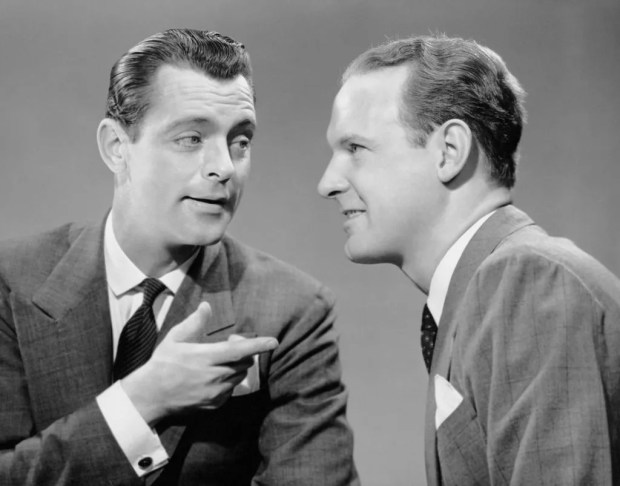You never forget your first corpse, do you? Cold, visceral, mute, lying there immune from the world and its cares. But, for many people in Britain, seeing a dead body has become a rare spectacle – something that many of us may never see at all. Given that we will all one day die, this aversion to death – a subject which most of us don’t even like to talk about – is bizarre.
In the Iliad, King Priam longs for the ‘heart-comforting embrace of my dead son Hector in my arms’, but the English way of death has become ever more removed from the corpse itself. Direct cremations, where the deceased is shipped straight from the hospital mortuary to an unattended crematorium burning, have risen from three to eighteen per cent of all deaths in the last three years, according to a ‘cost-of-dying report’ from SunLife insurance.
The rise in such cremations reflects an ever-greater distancing in the English funereal tradition from the remains of the deceased – once the very heart of Christian belief in the risen body of Jesus.
There’s another troubling issue with the English approach to death: over the last 20 years, the lapse of time between death and cremation, or burial, has lengthened, in some cases by up to six weeks. Sometimes this delay is voluntary, with burials fitting around the availability of relatives. But often, the hold-ups are not: instead, delays are effectively forced on mourning relatives by coroners’ bureaucracy and the self-interest of the funeral trade.
Death is an inevitable part of life, but, for many people in Britain, it remains hidden – until tragedy strikes
It doesn’t have to be this way: in France, the law states that a funeral must take place within six days of a death. But, this side of the Channel, the long wait kills off the swift gathering of friends or neighbours to mourn properly with the bereaved. By default, most English funerals have become memorials, in the presence of a closed coffin. An event distanced in time and emotional connection to the dying day of the relative within.
‘It’s all to do with the commercialisation of death. The big corporate chains of undertakers, who only have so many cars and staff, want to make sure they can run five to six funerals a day for up to six weeks in advance. I often have to tell people to phone up the crematorium themselves to check the truth of what they have been told,’ says Poetic Endings undertaker Louise Winter, who runs a bespoke independent funeral directorship in south London.
After decades of rising prices, where the cost of a funeral jumped up to 7 per cent annually, the Competition and Markets Authority has finally intervened: in 2021, it forced a reluctant undertaking profession to display prices on websites and in their offices to their grief stricken would-be clients.
In spite of this change, a funeral remains a ‘distress’ purchase where few families feel able to shop around. The market is dominated by the two big players – Dignity and Co-op Funerals – who between them own 1,800 funeral homes and have a combined market share of nearly 30 per cent. Even if you wanted to, it’s not easy to pick and choose in the British undertaking trade. Dignity also own almost one in six of Britain’s 300 crematoria. When the Grim Reaper visits, individual consumer choice is not high up the agenda.
By the time you have paid for the catering, flowers, and cards it costs up to £9,200 to die in the UK, with £4,000 of that spent on serviced cremation costs, or £5,200 on burial. For the poor, the cost of a funeral can consume 25 per cent of their annual income, hence the rising attraction of a £995 direct cremation package.
Death, of course, is not just about an arbitrary choices between oak, teak or pine coffins. Or working out the cheapest exit plan for what to do with dad’s dead body. As social and funereal rites around mortality have shrunk, a new grief industry has flourished. Legions of bereavement counsellors and grief therapists are on hand to soothe and cater for a generation who, in the absence of communally-held rituals, have rediscovered death all by themselves, when the worst happens to a loved one.
In the United States, the all-powerful American Psychiatric Association recently declared prolonged grief – those still grieving after a year – as a billable medically defined disorder. Its adoption in the UK is almost certain to swiftly follow. Grief has become a pathology we now suffer alone rather than a common human condition reflecting our inevitable mortality.
Perhaps it might be wiser instead, and more therapeutic, to copy how our ancestors learned to survive loss. We should be going to more funerals, even as children, and seeing how others grieve in common. Death is an inevitable part of life, but, for too many people in Britain, it remains hidden – until tragedy inevitably strikes.
Kevin Toolis is the author of My Fathers Wake: How the Irish Teach Us to Live, Love and Die
Got something to add? Join the discussion and comment below.
Get 10 issues for just $10
Subscribe to The Spectator Australia today for the next 10 magazine issues, plus full online access, for just $10.




















Comments
Don't miss out
Join the conversation with other Spectator Australia readers. Subscribe to leave a comment.
SUBSCRIBEAlready a subscriber? Log in